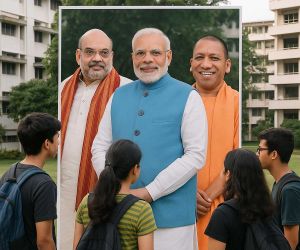MORE COVERAGE
Twitter Coverage
Satyaagrah
Written on
Satyaagrah
Written on
Satyaagrah
Written on
Satyaagrah
Written on
Satyaagrah
Written on
JOIN SATYAAGRAH SOCIAL MEDIA
"Sunak, wake up": Hindu families terrorized by Islamists in West Midlands, spine-chilling details of relentless persecution, labeled ‘Kafir,’ but Police deny hate crime citing 'no evidence,' yet a recent case implicates a British Muslim cop in the torment

In a shocking series of events, an Indian Hindu family residing in the West Midlands county of England has been subjected to multiple attacks by extremists since July this year. The disturbing aspect, however, lies in the local police's reluctance to classify these incidents as 'hate crimes,' according to a report by the British Broadcasting Corporation (BBC).
|
The victims of these repeated attacks have been identified as Ramana Nagumalli, his wife Radhika Kulkarni, and their 8-year-old daughter. Their plight began with the family reporting a total of five instances of harassment to the West Midlands police in July. One particularly harrowing incident involved the couple and their minor daughter being surrounded by a menacing mob outside a local leisure center.
Adding to the gravity of the situation, the aggressors recently escalated their attacks by targeting the family's residence. In a disturbing turn of events, these individuals physically assaulted the family's sense of security by aggressively kicking their front door. To compound the distress, the attackers resorted to using the term 'Kafirs' to dehumanize the victims – a derogatory expression often employed by radical Islamists to refer to non-Muslims.
Despite the evident pattern of targeted harassment and the distressing nature of the attacks, the local police have, bafflingly, refused to categorize these events as racially aggravated offenses. This raises crucial questions about the effectiveness of the law enforcement response and the adequacy of the legal framework in addressing such blatant acts of hostility.
The refusal to acknowledge the incidents as hate crimes poses significant concerns, as it may hinder the family's access to the protection and justice they deserve. As the victims grapple with the aftermath of these traumatic events, the broader community is left questioning the authorities' commitment to safeguarding the rights and well-being of all its members, regardless of their cultural or religious affiliations.
|
Victims Break Silence: Indian Hindu Family's Anguish Unveiled
The distressing ordeal faced by the Indian Hindu family in the West Midlands has reached a point where the victims are now gripped by fear, confining themselves within the walls of their own home. Radhika Kulkarni, one of the victims, bravely opened up about their harrowing experiences, shedding light on the profound impact these attacks have had on their lives.
Kulkarni, visibly shaken by the traumatic events, revealed, "I was shivering outside, I was just crying. I wasn't able to sleep. We didn't do anything to anyone. Why is this hate there?" Her poignant question resonates with the bewilderment and anguish that often accompanies targeted acts of prejudice.
Recalling a particularly alarming incident, Kulkarni described how the assailants forcibly surrounded her family, creating an intimidating circle. "They just grabbed us and made a circle around us. I got scared; I held my daughter’s hand and I just ran away," she recounted, underscoring the immediate threat and fear that permeated the situation.
|
The emotional toll of these incidents is evident in Kulkarni's words as she emphasized, "We've gone through so much, emotionally and mentally. We wanted them to be punished, in some way." The plea for justice reflects not only the family's desire for accountability but also the broader need for a legal system that swiftly addresses and condemns hate crimes.
Adding another layer to the victims' plight, Kulkarni expressed the family's yearning for a return to normalcy. "We don't want to live in fear. Everyone wants to live peacefully. We don't want anyone to go through what we've been through," she stated emphatically. The poignant desire for a life free from fear and persecution underscores the universal human longing for safety and security.
The psychological impact of these traumatic events is further highlighted by Kulkarni's revelation that the family has been haunted by nightmares and panic attacks. This sheds light on the enduring scars left by such incidents, emphasizing the urgency of addressing not only the immediate threats but also the long-term well-being of the victims. The following sections provide a deeper exploration of the family's plea for justice and the community's response to these disturbing events.
|
Police Response Sparks Controversy: Attacks on Indian Hindu Family Labeled Not a 'Hate Crime'
In a perplexing turn of events, the West Midlands police response to the distressing attacks on the Indian Hindu family has left the victims disillusioned. Despite their repeated pleas for justice, the police have chosen to downplay the severity of the situation, opting for a term that falls short of capturing the targeted nature of the attacks.
The family's complaint to the West Midlands police has, unfortunately, fallen on deaf ears, as the authorities claim there is insufficient evidence to classify the crimes as a 'racially aggravated offense.' This assertion contradicts the stark reality of the attacks, which were fueled by derogatory remarks and the use of the term 'Kafirs' – a clear indication of the religiously motivated nature of the harassment.
In response to an inquiry by the BBC, the police justified their stance by stating that the accused individuals had admitted to harassing the couple and their 8-year-old daughter. However, despite this admission, the authorities astonishingly refrained from categorizing the criminal offense as a 'hate crime.' This decision raises critical questions about the adequacy of the existing legal framework in recognizing and addressing acts of discrimination and prejudice.
|
The police spokesperson, in an official statement to the BBC, explained their position, saying, "(This included) speaking to the victims and the young people responsible for the offences at length…The parents of the young people were supportive of police action, and we are satisfied that a community resolution was the correct step to take given the young age of the people involved and their history of non-offending."
The notion of a 'community resolution' in lieu of acknowledging a hate crime designation has sparked controversy. The community resolution approach typically involves addressing minor offenses without resorting to formal legal proceedings. However, applying this resolution to a series of targeted attacks marked by religious slurs raises concerns about the potential trivialization of hate crimes.
The police's rationale for opting against a hate crime designation, citing the young age of the offenders and their history of non-offending, prompts reflection on the broader implications of such decisions. It brings into question the gravity attributed to acts of hatred and intolerance, emphasizing the need for a comprehensive reevaluation of the legal and enforcement mechanisms in place. The subsequent sections delve deeper into the controversy surrounding the police response and its ramifications on the victims and the community at large.
|
Victims Demand Justice Amidst Rising Hate Crimes in West Midlands
The Indian Hindu family, enduring a series of attacks that the police hesitate to label as hate crimes, is now vehemently advocating for justice. The victims express their frustration, emphasizing that the police should have pursued hate crime charges against the assailants. Such charges, they believe, would not only ensure accountability for the perpetrators but also serve as a deterrent, preventing others from enduring a similar harrowing ordeal.
The family's call for the categorization of these attacks as hate crimes gains significance against the backdrop of alarming statistics reported by the BBC. The West Midlands area has witnessed a staggering 251% increase in hate crimes, soaring from 2531 incidents in 2011-2012 to a concerning 8897 cases in 2022-2023. These figures underscore the urgent need for a robust response to hate crimes and a reevaluation of law enforcement strategies to effectively combat this disturbing trend.
The situation faced by the Indian Hindu family is not an isolated incident but part of a broader pattern of discrimination, as highlighted by a study conducted by the UK-based think tank, Henry Jackson Society. In April of this year, researcher Charlotte Littlewood conducted a comprehensive study, revealing that Hindu students across the country are experiencing bullying and racial discrimination within the confines of their classrooms.
Littlewood's study, based on interviews with 988 Hindu parents and surveys conducted in over 1000 schools in the United Kingdom, uncovered distressing instances of Hindu students being targeted by their Muslim classmates. The victims were not only bullied but also subjected to repeated pressure to convert to Islam, painting a concerning picture of religious discrimination within the educational system.
The revelations from the Henry Jackson Society study contribute valuable context to the Indian Hindu family's ordeal, illustrating that their experience is part of a broader issue affecting the Hindu community in the UK. As the victims continue to seek justice for the targeted attacks, the call for a comprehensive and proactive response to hate crimes becomes increasingly urgent. The next sections delve into the implications of the rising hate crime statistics and the broader impact on communities, urging for collective action and systemic change.
|
Disturbing Findings: Hindu Students Face Anti-Hindu Hate in UK Schools
The study conducted by the Henry Jackson Society reveals deeply troubling insights into the experiences of Hindu students in UK schools, shedding light on pervasive anti-Hindu hate and discrimination. A staggering "51% of Hindu parents surveyed reported that their child had experienced anti-Hindu hate in schools." This finding starkly contrasts with the alarming underreporting by schools, as "less than 1% of schools surveyed reported any anti-Hindu related incidents in the last 5 years."
The discrepancy between the high incidence of anti-Hindu hate reported by parents and the minimal acknowledgment by schools highlights a systemic failure in recognizing and addressing religious discrimination within the educational system. The disparity raises questions about the effectiveness of reporting mechanisms and the need for a more vigilant and responsive approach by schools to ensure the safety and well-being of all students.
The study further exposes the severity of the situation through specific instances of physical assaults and targeted bullying faced by Hindu students. The report details eight physical assaults, including the shocking incident of a female Hindu pupil having beef thrown on her. Additionally, a male student's plight is revealed as he was forced to change schools three times in East London due to persistent anti-Hindu bullying. These distressing accounts underscore the urgent need for a comprehensive and immediate response to ensure the safety and dignity of Hindu students in the UK.
Beyond physical assaults, the study raises concerns about the manner in which Hinduism is taught in schools. Littlewood notes that there is a problematic approach to teaching Hinduism that directly contributes to bullying in the classroom. Hindu students find themselves subjected to mockery for their vegetarianism, and their deities are belittled in a manner reminiscent of the radical Islamists who attacked the Hindu community in Leicester. This revelation points to a critical need for a reassessment of the curriculum and teaching methodologies to foster an environment of respect and understanding among diverse religious communities.
As the study brings to light the pervasive anti-Hindu hate in UK schools, it serves as a crucial wake-up call for educators, policymakers, and society at large. The next sections delve into the broader implications of these findings, calling for concerted efforts to address the root causes of religious discrimination and ensure a safe and inclusive educational environment for all students.
|
Perpetual Fear: Hindu Families in the UK Face Islamist Harassment Amidst Police Inaction
The latest coverage of these incidents by GB News, shared by British journalist Martin Daubney on social media, has sparked a wave of responses from concerned citizens. Netizens are coming forward to share chilling details of harassment faced by several Hindu families in the UK, shedding light on a distressing trend that demands immediate attention and intervention.
One user, identified as Bo, recounted the experience of a Hindu friend who had been subjected to such severe hatred that she made the difficult decision to stop wearing a bindi—a traditional Hindu symbol worn by women on the forehead between the eyebrows. This personal account underscores the profound impact of religiously motivated harassment, forcing individuals to alter their way of life to avoid becoming targets.
The shared experiences on social media highlight the urgent need for a comprehensive examination of the root causes of such attacks and the adequacy of the law enforcement response. The juxtaposition of repeated attacks and police inaction raises critical questions about the effectiveness of existing protocols in ensuring the safety and well-being of minority communities.
|
|
The chilling accounts of harassment faced by Hindu families in the UK extend to a user named klownShowz, who revealed that their friends, in an attempt to avoid drawing attention, refrain from wearing the bindi. Even more disconcerting is the revelation that the police have allegedly advised against culturally significant practices, cautioning them not to put rangoli or flowers on their doorways in the traditional Hindu festival style. This stark limitation on cultural expression raises serious concerns about the erosion of religious freedoms and the impact of such advisories on the Hindu community's ability to practice their faith openly and without fear.
In response to these revelations, a user replied to Bo's post, suggesting a possible lack of support from non-Muslims in the community. Bo responded by explaining that the targeted couple was initially quiet about their ordeal. It was only after they left and people inquired about their sudden departure that the true extent of their suffering became apparent. This revelation underscores the importance of community awareness and support, emphasizing the need for open dialogue and solidarity to combat religiously motivated harassment.
Another user, R Hilton, contributed to the discussion by highlighting that moderate Muslims also face targeting in the UK, citing incidents involving Ahmadi Muslims. These individuals, known for their motto "Love for All – Hatred for None," have reportedly had their information stalls attacked, particularly in areas like Kingston and Merton. The attackers, labeled as radicals, accuse Ahmadi Muslims of not being 'real Muslims.' This insight broadens the perspective on religious targeting, indicating that the issue extends beyond specific religious communities and demands a unified effort to address intolerance and discrimination in all its forms.
|
|
Communal Tensions: Muslims Moving Away and Hindu Colleagues Facing Daily Abuse
The unsettling narratives of religious tension and discrimination in the UK continue to unfold on social media. Bo, responding to another user, revealed that they have Muslim friends in Cornwall who chose to relocate, ostensibly to escape from the actions or presence of other Muslims. This revelation points to a complex and multifaceted dynamic within religious communities, suggesting that communal tensions and disagreements can manifest even within the same religious group.
Another user, Becks, shared a distressing account of her Hindu colleagues' experiences while working in a majority-Muslim hospital pharmacy. According to Becks, these colleagues faced daily verbal abuse and bullying, creating a hostile work environment. What adds to the gravity of this situation is the apparent indifference of the hospital management to the ongoing harassment. The lack of intervention from those in positions of authority raises critical questions about the commitment of institutions to ensuring a safe and inclusive environment for employees of all religious backgrounds.
These accounts collectively paint a stark picture of religious tensions and discriminatory behavior that extend beyond specific incidents to wider community dynamics and workplace environments. The reported decisions to relocate and the daily abuse faced by Hindu colleagues highlight the urgent need for systemic change to address religious discrimination and intolerance. The concluding sections will explore the broader implications of these revelations and emphasize the importance of fostering understanding, empathy, and unity within diverse communities.
 |
 Support Us
Support Us
Satyagraha was born from the heart of our land, with an undying aim to unveil the true essence of Bharat. It seeks to illuminate the hidden tales of our valiant freedom fighters and the rich chronicles that haven't yet sung their complete melody in the mainstream.
While platforms like NDTV and 'The Wire' effortlessly garner funds under the banner of safeguarding democracy, we at Satyagraha walk a different path. Our strength and resonance come from you. In this journey to weave a stronger Bharat, every little contribution amplifies our voice. Let's come together, contribute as you can, and champion the true spirit of our nation.
 |  |  |
| ICICI Bank of Satyaagrah | Razorpay Bank of Satyaagrah | PayPal Bank of Satyaagrah - For International Payments |
If all above doesn't work, then try the LINK below:
Please share the article on other platforms
DISCLAIMER: The author is solely responsible for the views expressed in this article. The author carries the responsibility for citing and/or licensing of images utilized within the text. The website also frequently uses non-commercial images for representational purposes only in line with the article. We are not responsible for the authenticity of such images. If some images have a copyright issue, we request the person/entity to contact us at This email address is being protected from spambots. You need JavaScript enabled to view it. and we will take the necessary actions to resolve the issue.
Related Articles
- National security or victims of Muslim rape gangs are not a priority for UK to avoid “Islamophobia” label as in most Western countries: Convicted pedophile Muslim MP served on government Muslim rape gang panel
- "या अल्लाह": Sara Sharif, a 10-year-old from Woking, found dead with severe injuries; her father, Urfan Sharif, confessed to beating her but blamed stepmother Beinash Batool, as forensic evidence and messages revealed abuse, triggering trial at Old Bailey
- London's Trocadero surrenders to the Karma of England's Colonial Past: New Mosque to bring inclusivity, Muslim billionaire Asif Aziz wins permission to turn one of central London's most famous landmarks and entertainment complexes into a mosque
- "Mirage shattered": London's charm fades as thefts rise, making Delhi a haven for Indian businessmen; luxury watches targeted, with 29,000 stolen in 5 years, sparking undercover stings in a city where Dickens' tales meet startling modern-day crime stats
- "दुआ़-ए-मंज़िल": Mohamed Iidow repeatedly raped Natalie Shotter, NHS worker and mother of three, while she lay unconscious on a park bench in Southall, leading to her death; CCTV footage captured the brutal assaults, and a court hearing begins
- "Fake news thrive because few verify what's real and always bias towards content that reinforces their own biases": Controversial Islamist Majid Freeman, who fanned Leicester riots with fake news, meets Leicester Mayor to peddle more poison against Hindus
- "Why not upset the apple cart? If you don't, the apples will rot anyway": Omar, Khalid, Jameel, Syed, Abbas, Musadaq, Amjad, Burhan, Asif, Shazad, Ibrahim, Ashfaq, Yousaf, Bhatti and others charged for raping minor girl for 4 yrs: Bradford child sex abuse
- Churchill's Old War Office, once a bastion of British power seized by Indians, behold as karma unfolds, Hinduja Group to transform his last memorial in London into a beacon of luxury, a testament to India's soaring global stature and boundless creativity
- "When you start attacking cronyism and people's political interests, it gets nasty": Leicester violence - Muslims attack Hindus who were protesting against earlier violence by Muslims against Hindus, religious symbols used to identify and target Hindus
- Muslim community headed by Attar Hussain converted 'Guru Ki Sarai' into Mosque by intimidating a Sikh family in Patiala, Sikh symbols replaced by Islamic symbols: Situation tense as Hindu organisations protest
- If not for Muslim appeasement, Vande Mataram would have been India's National Anthem: the history of Muslim opposition and support
- Propaganda techniques to blame Hindus for violence and paint Muslim aggressors as ‘good samaritans’
- Maulana Qamar Gani Usmani detained by Gujarat ATS in murder case of a Hindu Youth Kishan Bharwad, had incited prime accused to kill Kishan for ‘blasphemy’
- Left-liberal journalists attempt to whitewash Islamists' attack on Hanuman Jayanti procession of Hindus fall flat after Viral video shows the moment when the Shobha yatra was attacked first near a mosque in Jahangirpuri
- Bulldozer out to teach a lesson to criminals, rioters who create unrest in the society: Razed off all the shops near the dargah in Khambhat where stone-pelting took place on the chariots in Rath Yatra procession, Gujarat

























